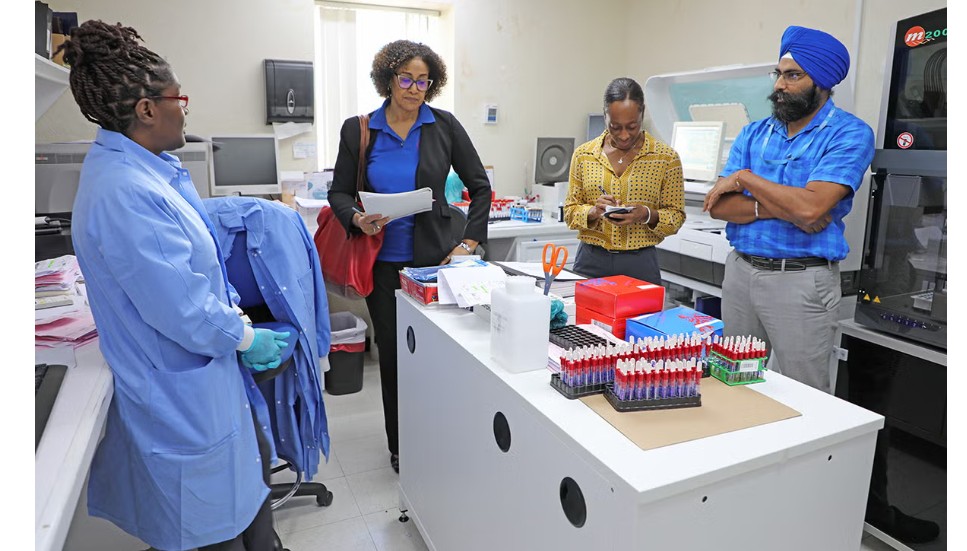“Los demócratas amenazan con cerrar todo el gobierno porque quieren otorgar cientos de miles de millones de dólares en beneficios de atención médica a inmigrantes ilegales”, declaró el vicepresidente J.D. Vance el 28 de septiembre en “Fox News Sunday”.
El presidente Donald Trump, el presidente de la Cámara de Representantes, Mike Johnson, y miembros republicanos del Congreso han repetido esto una y otra vez.
Es una afirmación equivocada.
Los demócratas se han negado a votar a favor de la resolución republicana de extender el plazo para el gasto federal, y su postura se basa, en parte, en el gasto en atención médica.
Los demócratas quieren extender los subsidios mejorados de la Ley de Cuidado de Salud a Bajo Precio (ACA) establecidos durante la pandemia de covid, que expiran a finales de año, y revertir los recortes a Medicaid incluidos en la ley de impuestos y gastos que Trump promulgó este verano.
La propuesta de los demócratas no busca ofrecer atención médica a los inmigrantes sin estatus legal; esa población ya es, en gran medida, no elegible para la atención médica financiada por el gobierno federal. En cambio, la propuesta restablecería el acceso a ciertos programas de atención médica para los inmigrantes con papeles que perderán el acceso bajo la ley republicana.
La Casa Blanca no respondió al pedido de comentarios de PolitiFact para esta verificación de datos. Vance respondió a las críticas sobre su argumento en otra entrevista, afirmando que estaba incluido en la propuesta de gasto de los demócratas. No está.
Una cuenta de la Casa Blanca en X siguió con el tema publicando capturas de pantalla de la propuesta demócrata que deroga una sección de la ley republicana denominada “elegibilidad de extranjeros para Medicaid”. Es importante saber que estos cambios no darían acceso a Medicaid a los inmigrantes sin estatus legal.
Vance defendió su declaración nuevamente en una conferencia de prensa en la Casa Blanca el 1 de octubre, afirmando que el ex presidente Joe Biden “eliminó el estatus migratorio ilegal”, lo que facilitó el acceso de migrantes a la asistencia federal.
Es importante tener en cuenta que muchas personas a las que se les otorga estatus legal a través de programas de permiso humanitario o Estatus de Protección Temporal (TPS) no califican automáticamente para Medicaid; los beneficiarios del TPS no son elegibles, y muchas personas que entraron al país con permiso humanitario deben esperar cinco años antes de acceder al programa.
La administración Trump ha cancelado el permiso humanitario y el TPS para muchas personas, volviéndolas no elegibles para Medicaid y los planes de salud del mercado de ACA.
No encontramos evidencia de que los demócratas quieran gastar cientos de miles de millones para que los inmigrantes sin papeles tengan seguro de salud.
Los inmigrantes sin estatus legal ya no son elegibles
La mayor parte de los fondos federales para la atención médica no se pueden gastar en personas que están en el país sin papeles. No pueden inscribirse en Medicaid ni Medicare, y no son elegibles para adquirir cobertura médica a través de los mercados de seguros establecidos por ACA.
Un pequeño programa de Medicaid reembolsa a los hospitales por atención médica de emergencia para personas sin seguro médico, lo que puede incluir a inmigrantes que se encuentran en el país sin autorización, pero no es exclusivo para ellos.
Estados como Illinois y California ampliaron la cobertura de Medicaid para personas sin importar su estatus migratorio, y los estados pagan por esta cobertura. La ley federal ya prohibía a los estados utilizar fondos federales para estos programas. Una versión anterior de la ley de gastos republicana habría penalizado a dichos estados reteniendo fondos, pero esa disposición no perduró.
Las personas que se encuentran en el país sin permiso podrían recibir atención médica financiada por el gobierno federal en casos de emergencia; en esas situaciones, los hospitales deben brindar atención incluso si la persona no tiene seguro médico o no tiene papeles. El Medicaid de Emergencia cubre la atención hospitalaria para inmigrantes que serían elegibles para Medicaid de no ser por su estatus migratorio. La ley republicana de impuestos y gastos redujo la cantidad que los hospitales pueden recibir por proveer esta atención.
La mayor parte del gasto del Medicaid de Emergencia se destina a partos. En total, representó menos del 1% del gasto total de Medicaid en el año fiscal 2023, según KFF, una organización de información de salud sin fines de lucro que incluye a KFF Health News.
Ley republicana limitó el acceso a la salud para inmigrantes con estatus legal
La ley republicana de impuestos y gastos introdujo varios cambios en la elegibilidad para la atención médica de los inmigrantes que viven en el país con papeles. Se estima que 1,4 millones de inmigrantes legales perderán su seguro médico, según un análisis de KFF sobre las proyecciones de la Oficina de Presupuesto del Congreso (CBO).
A partir de octubre de 2026, la ley restringirá la elegibilidad para Medicaid y el Programa de Seguro Médico Infantil (CHIP) a residentes permanentes legales, a las personas de las Islas Marshall, Micronesia o Palaos que residan legalmente en el país en virtud de un acuerdo internacional, y a ciertos cubanos y haitianos.
Anteriormente, un amplio grupo, definido como “no ciudadanos calificados”, cumplía con los requisitos para Medicaid y CHIP, incluyendo refugiados y personas a quienes se les había concedido asilo.
Algunos inmigrantes elegibles para Medicaid y CHIP, como los residentes permanentes legales, deben esperar cinco años antes de acceder a los beneficios.
La ley también limitó la elegibilidad para obtener seguros en los mercados de ACA al mismo grupo elegible para Medicaid y CHIP a partir del 1 de enero de 2027. Antes, las personas descritas como “legalmente presentes” eran elegibles. Este grupo incluía a los “no ciudadanos calificados” elegibles para Medicaid y a personas con estatus de corto plazo, como el TPS o estudiantes internacionales.
Los beneficiarios del programa de Acción Diferida para los Llegados en la Infancia (DACA), para inmigrantes que llegaron al país de niños, sin autorización, cumplían antes con los requisitos para la cobertura de ACA y sus subsidios. Pero ya no son elegibles desde que una norma de la administración Trump entró en vigencia en agosto.
Propuesta demócrata restauraría el acceso para inmigrantes legales
La propuesta presupuestaria de los demócratas, presentada el 17 de septiembre, extendería, en parte, de forma permanente los subsidios de ACA, y revertiría miles de millones de dólares en recortes republicanos a Medicaid y a otros programas de salud.
El cambio haría que la cobertura de Medicaid, CHIP y ACA estuviera disponible para todos los inmigrantes legales que anteriormente eran elegibles, como refugiados y personas que recibieron asilo.
La propuesta demócrata no ampliaría la elegibilidad a los programas de atención médica financiados por el gobierno federal para inmigrantes sin estatus legal.
Vance dijo que las políticas demócratas otorgarían cientos de miles de millones de dólares en beneficios de atención médica a inmigrantes indocumentados, y la Casa Blanca no reveló la fuente de esa cifra. Cuando se presionó a Johnson para que apoyara un argumento similar, citó a la CBO.
El análisis de KFF sobre las estimaciones de la CBO halló que las disposiciones de la ley republicana relacionadas con los inmigrantes legales reducirían el gasto federal en $131 mil millones; esta proyección no incluía una estimación para las personas sin estatus legal.
Nuestra decisión
Vance declaró: “Los demócratas amenazan con cerrar todo el gobierno porque quieren otorgar cientos de miles de millones de dólares en beneficios de atención médica a inmigrantes indocumentados”.
Los inmigrantes que se encuentran en Estados Unidos sin autorización legal en gran medida no son elegibles para los programas de atención médica financiados por el gobierno federal, Medicare y Medicaid, y no pueden buscar cobertura en el mercado de ACA ni solicitar subsidios.
La propuesta presupuestaria de los demócratas no cambiaría esto.
Los demócratas quieren restaurar el acceso a ciertos programas de atención médica para inmigrantes legales que perderán el acceso bajo la ley republicana de impuestos y gastos, entre otras medidas destinadas a facilitar la conservación de los planes de seguro de Medicaid y ACA.
Su propuesta no otorgaría beneficios de atención médica financiados por el gobierno federal a las personas que se encuentran en el país sin autorización legal, porque nunca tuvieron acceso a ellos en primer lugar.
La pequeña cantidad de fondos designada para el Medicaid de Emergencia reembolsa a los hospitales que brindan atención de emergencia a inmigrantes que serían elegibles para Medicaid de no ser por su estatus migratorio. Finalmente, no encontramos evidencia que respalde la afirmación de Vance de que los demócratas quieren “cientos de miles de millones” en beneficios de salud para los migrantes que residen ilegalmente en el país.
Calificamos esta afirmación como falsa.
Nuestras fuentes
Fox News, “JD Vance Slams ‘Preposterous’ Claims on Comey Indictment: ‘Lied Under Oath’, Sept. 28, 2025.
The White House, “President Trump Delivers an Announcement,” Sept. 30, 2025.
President Donald Trump, Truth Social post, Sept. 29, 2025.
U.S. House of Representatives bill, accessed Oct. 1, 2025.
Congressional Budget Office, “Distributional Effects of Public Law 119-21,” Aug. 11, 2025.
PolitiFact, “Newsom Championed Medicaid for Immigrants in California Illegally. Now He Wants To Cut It Back,” May 16, 2025.
KFF, “Health Provisions in the 2025 Federal Budget Reconciliation Bill,” July 8, 2025.
KFF, “Potential Impacts of 2025 Budget Reconciliation on Health Coverage for Immigrant Families,” June 17, 2025.
KFF, “Key Facts on Health Coverage of Immigrants,” Jan. 15, 2025.
KFF, “1.4 Million Lawfully Present Immigrants Are Expected To Lose Health Coverage Due to the 2025 Tax and Budget Law,” Sept. 25, 2025.
U.S. Citizenship and Immigration Services, “Information for SAVE Users: Cuban-Haitian Entrants,” accessed Oct. 1, 2025.
U.S. Citizenship and Immigration Services, “Status of Citizens of the Freely Associated States of the Federated States of Micronesia and the Republic of the Marshall Islands Fact Sheet,” accessed Oct. 1, 2025.
Healthcare.gov, “Coverage for Lawfully Present Immigrants,” accessed Oct. 1, 2025.
Federal Register, “Patient Protection and Affordable Care Act; Marketplace Integrity and Affordability,” June 25, 2025.
KFF Health News is a national newsroom that produces in-depth journalism about health issues and is one of the core operating programs at KFF—an independent source of health policy research, polling, and journalism. Learn more about KFF.
USE OUR CONTENT
This story can be republished for free (details).





